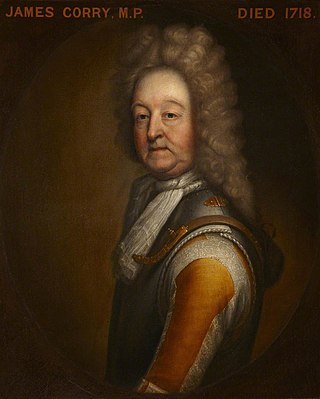Related Research Articles

Field Marshal Charles Moore, 1st Marquess of Drogheda, styled Viscount Moore from 1752 until 28 October 1758 and then Earl of Drogheda until 2 July 1791, was an Irish peer and later a British peer, and military officer. He bore the colours of his regiment at the Battle of Culloden in April 1746 during the Jacobite risings and later commanded the 18th Light Dragoons during operations against the Whiteboys in Ireland. He also sat as Member of Parliament in the Irish House of Commons and, having served as Chief Secretary to the Lord Lieutenant of Ireland, he went on to become Master-General of the Irish Ordnance.

Earl of Dartrey, of Dartrey in the County of Monaghan, was a title in the Peerage of the United Kingdom. It was created in July 1866 for The 3rd Baron Cremorne.
Sir John Leslie, 2nd Baronet was an Anglo-Irish soldier and baronet.

Colonel James Corry was an Irish politician and soldier.

John Henry Crichton, 4th Earl Erne,, styled Viscount Crichton from 1842 to 1885, was an Anglo-Irish peer and Conservative politician.

Edward Clive, 1st Earl of Powis,, known as the Lord Clive between 1774 and 1804, was a British politician who sat in the House of Commons from 1774 to 1794 when he was raised to the peerage as Baron Clive.

George Montgomery (1562–1621) was a Scottish protestant cleric, promoted by King James VI and I to various Irish bishoprics. He held the offices of Rector of Chedzoy, Somerset; Dean of Norwich (1603); Bishop of Raphoe, Bishop of Clogher, Bishop of Derry (1605); and Bishop of Meath (1610).
Colonel Alexander Montgomery was an Irish soldier and politician.
Thomas Montgomery was an Irish politician. Unlike his father and his sons Montgomery never appeared to have served in the British Army.
General Alexander Montgomery (c.1721—1785) was an Irish MP for County Monaghan, Ireland.
John Montgomery was an Irish MP for County Monaghan, Ireland.
Colonel Alexander Montgomery was an Irish soldier and MP.
John Montgomery M.P. for County Monaghan, Ireland from October 1741 until his death a month later in November 1741. He was succeeded as Monaghan M.P. by his younger brother General Alexander Montgomery.
Colonel Nathaniel Montgomery-Moore of Garvey, Co. Tyrone and Fassaroe Castle, Co. Wicklow was an Irish Member of Parliament.

Sir William Verner, 1st Baronet, KCH, was a British soldier who served in the Napoleonic wars, was wounded at the Battle of Waterloo and resigned as a colonel. He served as a politician, including 36 years as a Member of Parliament. Two of his sons were also members of Parliament. Verner was made Knight Commander of the Hanoverian Order and a Baronet, and was Grand Master of Armagh and Orange Order of Ireland.

Colonel Thomas de Burgh, always named in his lifetime as Thomas Burgh, was an Anglo-Irish military engineer, architect, and Member of the Parliament of Ireland who served as Surveyor General of Ireland (1700–1730) and designed a number of the large public buildings of Dublin including the old Custom House (1704–6), Trinity College Library (1712–33), Dr Steevens' Hospital (1719), the Linen Hall (1722), and the Royal Barracks.

Thomas Ridgeway, 1st Earl of Londonderry was an English administrator active in Ireland, in particular in the Ulster Plantation.
Derrick Warner William Westenra, 5th Baron Rossmore, known as The Hon. Derrick Westenra until March 1874, was an Anglo-Irish noble, soldier, author and Orangeman.
Richard Dawson was an Irish Member of Parliament.

Robert King, 2nd Earl of Kingston was an Anglo-Irish peer. He was styled Viscount Kingsborough between 1768 and 1797.
References
- ↑ E. M. Johnston-Liik (1 October 2006). MPs in Dublin: Companion to History of the Irish Parliament, 1692-1800. Ulster Historical Foundation. p. 108. ISBN 978-1-903688-60-1 . Retrieved 2 February 2013.
- ↑ "Records of the Monaghan Militia" (PDF). Retrieved 14 October 2013.